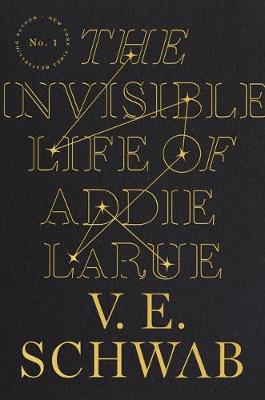Reviewed by Witty and Sarcastic Bookclub on
The elements of Faust were expected. The main character, Addie LaRue, trades her soul to the devil for freedom from obligations (see: forced marriage) and all the time she desires. She will only die and lose her soul when she folds and tell the Devil she’s done with life. The catch – there’s always a catch when the Devil’s involved – is that she won’t be remembered by anyone. Ever. She’ll slip out of sight and immediately out of mind the second a door closes, or a person turns away. She is essentially a ghost. After 300 years, Addie has grown used to it. Until one day she meets a bookseller and he remembers her.
Up until the meeting, Addie’s life is told in terms of her testing her boundaries. She dances in and out of history, seeing but unable to leave a mark. This removed view of different historical times felt a little Anne Rice to me. I happen to love how Anne Rice is able to use her dead characters to bring different times to life (bad pun intended). Unfortunately, as good a writer as Schwab is, her strength is not in this sort of writing. It felt forced and, honestly, did not interest me all that much. There were several descriptions of one-night stands (either physically or emotionally) and they became rather redundant after a while.
More interesting was Addie’s inner dialogue. She was very concerned with leaving her mark and wondering whether a person really exists if no one ever remembers them. The solitary inner dialogue of the book was periodically broken up by visits from the Devil, in which he tried to coerce or scare her into giving up. She comes close, but the man who remembers her changes everything. Enter Henry.
Henry is a bookseller who, instead of forgetting Addie as everyone does, remembers her. I won’t explain the why and spoil it, but it was interesting, though expected. I found his character to be much more interesting and three dimensional. His fear of not experiencing everything which leads to an anxious energy, combined with the feeling of not ever being enough, was something I think everyone relates to in the smaller sense.
Addie and Henry start a relationship, but I feel like she is only attracted to Henry because he remembers her. It has nothing to do with who he is, which bothered me. She is more interested in what he can do for her than in what they can do together. I did like their sense of urgency, neither of them knowing how much time they’ll get together before things come undone. Here is where it felt a little reminiscent of Eternal Sunshine of the Spotless Mind: the reader sees what a relationship looks like in snapshots, knowing that it doesn’t last.
The ending was good, if expected. Really, there was no other way for it to end. It got a little schmaltzy, but not to the point that I couldn’t stand it. To be honest, I liked the book, but I didn’t love it. I feel like Schwab does better with ideas that offer a little more freedom to exercise her creativity. Instead of doing a unique twist on the “deal with the devil” idea, her talents might have been better displayed in a different setting. Don’t get me wrong: in no way was the book bad, it just didn’t grab me the way I hoped it would. This would be a good one to read after finishing a doorstop of a novel, or as a breather after reading an emotionally exacting book.
Have you read this book? What did you think?
https://wittyandsarcasticbookclub.home.blog/2020/12/13/the-invisible-life-of-addie-larue/
Reading updates
- Started reading
- 1 December, 2020: Finished reading
- 1 December, 2020: Reviewed
- Started reading
- Finished reading
- 1 December, 2020: Reviewed
